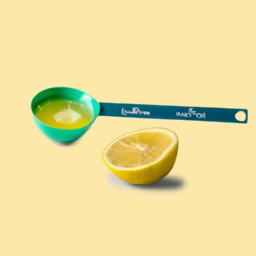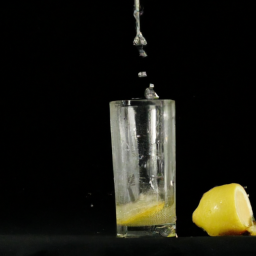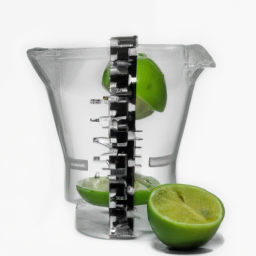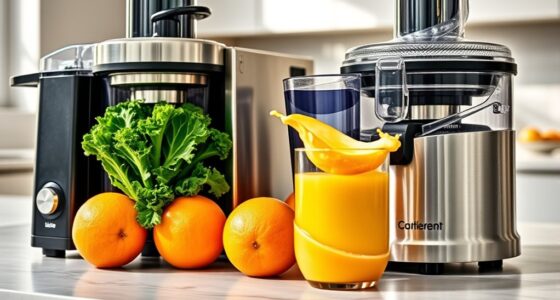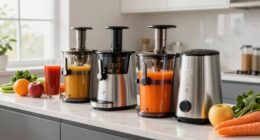Did you know that a single lemon can produce 2-4 tablespoons of juice? Although it may seem like a small amount, in the world of cooking and cocktail making, this modest volume can have a big impact on the final result.
Lemon juice is a versatile ingredient that can be used to add brightness and acidity to a variety of dishes, from salad dressings to marinades to cocktails.
But how much juice can you really expect from one lemon? That’s a question that many home cooks and bartenders often ask themselves. The answer depends on a variety of factors, including the ripeness and size of the lemon, as well as the juicing technique used.
In this article, I’ll explore the science behind lemon juice, share tips for getting the most juice out of your lemons, and provide guidance on measuring and storing lemon juice for use in your favorite recipes.
Key Takeaways
- The amount of juice in one lemon can vary depending on factors such as ripeness, size, and juicing technique.
- On average, one lemon yields 2-3 tablespoons of juice.
- Meyer lemons yield more juice than Eureka lemons.
- Using a lemon squeezer or citrus reamer can help get the most juice out of a lemon.
Understanding the Importance of Lemon Juice in Cooking and Mixology
You’re gonna love using lemon juice in your cooking and mixology – it adds a refreshing zing that can’t be beat!
In fact, lemon juice is a staple in many classic cocktails, including the margarita and the daiquiri. It can also be used to brighten up savory dishes like fish, chicken, and vegetables. But did you know that lemon juice also has a range of health benefits? It’s packed with vitamin C, which is great for boosting your immune system, and can even help with digestion.
When it comes to mixing cocktails, lemon juice is a must-have ingredient. Not only does it add a tart and tangy flavor, but it also helps to balance out the sweetness of other ingredients like simple syrup or fruit juices. And because it’s so versatile, you can use it to make a wide variety of cocktails – from classic sours to modern twists on old favorites. So, the next time you’re mixing up a drink, don’t forget to add a splash of lemon juice!
Now, let’s talk about the factors that can affect the amount of juice you’ll get from one lemon.
Factors Affecting the Amount of Juice in One Lemon
When looking to maximize the amount of citrus flavor in your recipe, it’s important to consider the factors that impact the yield of a single lemon’s juice. Factors such as the variety of lemon, its ripeness, and the method used for juicing can all affect the amount of juice that can be extracted from a single lemon.
Firstly, the variety of lemon used can significantly impact the juice yield. Meyer lemons, for example, are known to contain more juice than Eureka lemons. Additionally, the ripeness of the lemon can also play a role. Ripe lemons tend to have a softer flesh that can be easier to juice, while unripe lemons may require more effort to extract the juice.
When it comes to juicing, using a handheld juicer or rolling the lemon on a hard surface before cutting it can help to release more juice. Considering these factors can help to ensure that your recipe achieves the desired flavor profile.
When it comes to choosing the right lemons for juicing, there are a few steps to consider.
How to Choose the Right Lemons for Juicing
To ensure the best flavor in your recipe, it’s important to choose lemons that are ripe and plump, as well as have a thin and smooth skin.
When choosing ripe lemons, look for ones that are heavy for their size and have a bright yellow color. Avoid overripe lemons that have a wrinkled or dull appearance, as these may have less juice and a weaker flavor.
In addition to appearance, the texture of the skin can also indicate the juiciness of the lemon. A thin and smooth skin is typically easier to juice than a thick and bumpy skin.
When squeezing the lemon, you want to apply gentle pressure to release the juice without perforating the skin. With the right lemons and techniques, you can extract maximum juice for your recipes.
Techniques for Extracting Maximum Juice from Lemons
By using a lemon squeezer, you’re getting every drop of sunshine from a lemon, ensuring you get the most out of your citrus fruit. Using kitchen tools like a lemon squeezer or a citrus reamer is the best way to extract maximum juice from lemons.
Here are some best practices for juicing lemons and minimizing waste:
- Roll the lemon on the counter with some pressure before cutting it in half to break down the membranes and release the juice.
- Use a spoon to scrape out any remaining flesh and juice from the inside of the lemon after juicing.
- Use a fine-mesh strainer to strain the juice to remove any pulp or seeds.
These techniques will not only help you extract more juice from your lemons but also reduce waste.
Now that we’ve learned how to extract maximum juice from lemons, let’s move on to measuring lemon juice for recipes.
Measuring Lemon Juice for Recipes
Measuring the tangy nectar of a freshly squeezed lemon is essential to get the perfect balance of flavors in your recipes. When it comes to measuring lemon juice, accuracy is key. Depending on the recipe, even a small difference in the amount of lemon juice used can greatly affect the final taste. To ensure accuracy, use a measuring cup or spoon when squeezing the lemon.
To help you understand the amount of juice you can expect from a lemon, here is a table comparing the juice yield of different citrus fruits:
| Citrus Fruit | Amount of Juice |
|---|---|
| Lemon | 2-3 tablespoons |
| Lime | 2 tablespoons |
| Orange | 1/4 – 1/3 cup |
Although lemon is the most commonly used citrus fruit in cooking, it’s good to know that there are alternative options available. Lime is a great substitute for lemon juice, especially in Mexican cuisine, while orange juice can add a sweet and tangy flavor to your recipes. Now that we know the importance of measuring accuracy and the options available, let’s dive into how much juice to expect from one lemon.
How Much Juice to Expect from One Lemon
I’ve always wondered how much juice I can expect to get from one lemon when I’m making a recipe that calls for it. After doing some research, I learned that the average yield for one lemon is about 2-3 tablespoons of juice.
However, this amount can vary based on factors such as the size, ripeness, and juiciness of the lemon.
Average Yield
On average, squeezing the juice out of one lemon yields about 2-3 tablespoons. This may not seem like a lot, but when combined with other ingredients, it can add a burst of flavor to any dish. Not only does lemon juice add a tangy taste, but it also provides nutritional benefits such as vitamin C and antioxidants.
To give you a better idea of just how beneficial lemon juice can be, here are some fascinating facts about its nutritional content:
- One lemon contains 31% of the recommended daily intake of vitamin C.
- The antioxidants in lemon juice can help protect against free radicals that can damage cells.
- Lemon juice can aid digestion by stimulating the production of stomach acid.
- Drinking lemon water can help hydrate the body and promote healthy skin.
While the average yield of lemon juice is 2-3 tablespoons, there are several factors that can affect this amount. From the ripeness of the lemon to the juicing technique used, each element can play a role in the final yield.
Variations Based on Factors
Now that we know the average yield of lemon juice, let’s dive into the variations of this yield based on several factors. One of the most significant factors that affect the amount of juice in a lemon is its acidity level. The higher the acidity level of the lemon, the more juice it is likely to yield. Therefore, it’s better to choose lemons that are ripe and have a slightly softer texture, as they tend to be more acidic and produce more juice. Additionally, rolling the lemon on a hard surface before juicing it can help to break down the cells and release more juice.
However, there may be times when you don’t have access to fresh lemons or want to try a different flavor. In such cases, you can substitute lemon juice with other citrus juices such as lime, grapefruit, or orange. These juices have a similar acidity level and can provide a similar flavor profile to lemon juice. However, keep in mind that the taste may not be exactly the same, and it’s always better to use fresh lemons whenever possible.
When it comes to storing and preserving lemon juice, there are a few tips and tricks that can help to extend its shelf life.
Tips for Storing and Preserving Lemon Juice
When it comes to storing and preserving lemon juice, there are several methods that I’ve found to be effective.
One option is refrigeration, which can keep the juice fresh for up to a week.
Freezing is another option, allowing you to store the juice for several months.
Bottling and canning are also popular methods for long-term preservation.
Refrigeration
You’ll want to keep your freshly squeezed lemon juice in the fridge to maximize its flavor and shelf life. Lemon juice is highly perishable and can go bad quickly if left at room temperature.
Refrigeration can help extend its shelf life for up to 2-3 weeks. Aside from its culinary uses, lemon juice can also be used for various purposes such as cleaning, skin care, and even as a natural remedy for sore throat.
Refrigerating your lemon juice will ensure that it remains fresh and potent for all these uses. Now, if you want to further extend its shelf life, the next step would be to freeze it.
Freezing
To freeze your fresh lemon juice, simply pour it into an ice cube tray and pop it in the freezer.
Freezing is a great way to extend the shelf life of lemon juice, as it can last for up to six months in the freezer. Just make sure to label your ice cube tray with the date you froze the juice, so you can keep track of when it was made.
When it comes time to use your frozen lemon juice, simply pop out a cube or two and let it thaw in the fridge for a few hours. You can also thaw it at room temperature, or in the microwave if you’re in a hurry.
Once thawed, the lemon juice will have the same flavor and acidity as fresh juice, making it a convenient and cost-effective way to have lemon juice on hand whenever you need it.
With that said, let’s move on to the next step: bottling and canning.
Bottling and Canning
If you’re looking for a way to preserve your fresh lemon juice for future use, bottling and canning is a great option.
Bottling techniques involve pouring the juice into sterilized jars, leaving some headspace at the top, and sealing them tightly. Canning, on the other hand, involves heating the juice in a water bath or pressure canner, which kills any bacteria and creates a vacuum seal that extends the juice’s shelf life.
When properly bottled or canned, lemon juice can last for up to a year. However, it’s important to note that the juice’s shelf life depends on several factors such as the acidity level, sugar content, and temperature at which it’s stored.
To ensure the longest shelf life possible, it’s recommended to store bottled or canned lemon juice in a cool, dry place away from sunlight.
If you’re not up for bottling and canning, there are other ways to obtain citrus juice. Let’s explore some alternative sources in the next section.
Alternative Sources of Citrus Juice
There’s a multitude of ways to add a citrusy kick to your dish without solely relying on the juice of one lemon. Here are some alternative sources of citrus juice that can be just as tasty and beneficial:
-
Lime juice: Similar to lemon juice, lime juice is a great substitute in recipes calling for citrus juice. It has a slightly different flavor, but still adds acidity and brightness to dishes.
-
Orange juice: While not as tart as lemon or lime juice, orange juice can still add a nice citrus flavor to dishes. It’s especially delicious in marinades and dressings.
-
Grapefruit juice: Grapefruit juice is tart and slightly bitter, making it a good option for balancing out sweet dishes. It’s also a great source of vitamin C.
-
Lemon water: If you’re looking for the health benefits of lemon juice without the tartness, try drinking lemon water. It’s a great way to stay hydrated and can aid in digestion and skin health.
With these alternative sources of citrus juice, you can add a citrusy kick to your dishes without relying solely on the juice of one lemon. But if you do want to use lemon juice, here are some delicious recipes featuring lemon juice that you can try.
Recipes Featuring Lemon Juice
Get ready to add a zesty burst of flavor to your meals with these delicious recipes featuring the tangy goodness of fresh lemon juice.
Not only does lemon juice add a bright and refreshing taste to dishes, but it also has many health benefits. Lemon juice is high in vitamin C, which supports the immune system and aids in the absorption of iron. It also contains antioxidants that can help protect against cell damage and reduce inflammation.
If you don’t have fresh lemon juice on hand, there are several substitutes you can use. Lime juice has a similar flavor profile and can be used interchangeably in most recipes. White wine vinegar and apple cider vinegar can also be used as substitutes, but keep in mind that they may alter the taste slightly.
Now, onto the recipes! Lemon juice is a versatile ingredient that can be used in everything from marinades and dressings to desserts and cocktails. Try using it in a simple vinaigrette for a bright and tangy salad dressing, or add it to a marinade for grilled chicken or fish. For a sweet treat, try making lemon bars or lemon meringue pie. The possibilities are endless with this versatile ingredient.
Frequently Asked Questions
Can lemon juice be substituted with other citrus juices in recipes?
Yes, lemon juice can be substituted with other citrus juices in recipes. However, the amount and acidity level may need to be adjusted. Grapefruit, lime, and orange juices are popular substitutes.
How long can fresh lemon juice be stored in the refrigerator?
To properly store fresh lemon juice in the refrigerator, transfer it to an airtight container and keep it for up to one week. Use leftover lemon juice before it goes bad by adding it to drinks, dressings, or marinades.
Does the ripeness of a lemon affect the amount of juice it contains?
As the saying goes, "you can’t make lemonade without lemons."The ripeness of a lemon can affect its juice yield. Using proper juice extraction techniques can maximize juice extraction regardless of ripeness.
Can lemon juice be frozen for later use?
Yes, lemon juice can be frozen for later use. It’s best to freeze it in an ice cube tray and then transfer the frozen cubes to a freezer bag. Lemon juice concentrate is also an option for longer storage.
Is it necessary to use a specific type of juicer for extracting lemon juice?
I’ve found that there are various juicer types that can be used for extracting lemon juice, such as manual or electric ones. The extraction method also varies, but it’s important to choose one that minimizes pulp and maximizes juice yield.
Conclusion
Well folks, that’s all there is to know about the juice of one lemon! As a food enthusiast and mixology aficionado, I can’t stress enough the importance of having fresh lemon juice on hand.
From adding a zesty flavor to your favorite dishes to creating the perfect cocktail, lemon juice is a must-have ingredient.
But before you start juicing away, remember to choose the right lemons and use proper techniques to get the most juice out of each fruit. And don’t forget to measure the juice for your recipes!
With these tips and tricks, you’ll be a lemon juice pro in no time. So go ahead, add a little zest to your life and enjoy the sweet (or sour) taste of this versatile citrus fruit. Cheers!
